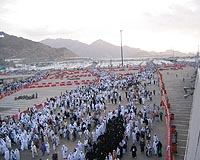| . |  |
. |
Cape Town (AFP) July 23, 2009 South Africa has launched human trials of the first African-produced HIV vaccine, as scientists seek new approaches to battling AIDS in the world's worst-affected country. The locally produced vaccine, being tested in Soweto and Cape Town as well as a site in the United States, was the highlight of an international AIDS conference in Cape Town this week where the trial was officially launched. A successful vaccine, while years away, could be the only solution for a country with nearly six million infections, where the financial burden of treating AIDS patients threatens to cripple the health system. "If we don't find a prevention strategy for South Africa we are in big trouble. We are not going to treat ourselves out of this epidemic," Linda-Gail Bekker, a principal investigator on the trial, told AFP. "We can't afford to let six million people die. The question is, can we afford to keep the tap flowing. There is no question that a vaccine is the best way to treat an infectious disease." A total of 48 volunteers will take part in the study, 36 in South Africa. The phase one trials will investigate whether the drug is safe for human use. The vaccine, developed at the University of Cape Town and manufactured with input from the US National Institutes of Health, is the first to go on trial in the country since 2007. That trial of a vaccine by pharmaceutical company Merck was stopped after studies found it actually heightened the risk of AIDS infection, striking a double blow to efforts to find a vaccine 30 years into the pandemic. Disappointments in the vaccine effort have sparked arguments that more money should be spent on other prevention efforts such as microbicides -- anti-HIV substances which reduce risk of infection -- and male circumcision, which show more potential. A report released at the conference of the International AIDS Society on treatment showed that for the first time in a decade AIDS vaccine research declined, by 10 percent in 2008. "There is this notion of 'let's go back to the drawing board (but) you still gain an enormous amount of knowledge even though studies get stopped," Bekker said. Jerry Coovadia, co-chair of the world's largest scientific AIDS conference, said the prevention research field was in a "taking stock" stage ahead of the release of results from several large-scale trials. Some 25 million people have died from AIDS. While a preventative vaccine is seen as first prize, a so-called therapeutic vaccine could ease the lives of millions taking anti-retroviral (ARVs) drugs. David Sheon, spokesman for Norwegian drug company Bionor Immuno, said that for AIDS patients who have developed a resistance to current ARVs, a therapeutic vaccine is critical. The company is testing a vaccine which appears to reduce the amount of HIV in the body, enabling some trial patients to stay off their ARVs for up to five years. "Even those who are extremely involved in preventative vaccines acknowledge there is an urgent need for a therapeutic vaccine to treat the patients who actually already have HIV," he told AFP. "There is also a prospect a therapeutic vaccine may slow or stop the transmission of HIV." About 30 other clinical vaccine trials are underway around the world, but the most-watched is the biggest ever study in Thailand in which 16,000 people enrolled that began in 2003, with results expected later this year. Positive results from that trial would bode well for South Africa's vaccine which uses a similar method in its drug. Share This Article With Planet Earth
Related Links Epidemics on Earth - Bird Flu, HIV/AIDS, Ebola
 Arab health ministers to ban elderly, young from pilgrimage
Arab health ministers to ban elderly, young from pilgrimageCairo (AFP) July 22, 2009 Arab health ministers agreed on Wednesday to ban certain people including the elderly and young children from pilgrimage to Mecca in an effort to contain the spread of swine flu. "Hajj and umrah will continue with some conditions," Ibrahim al-Kerdani, World Health Organisation spokesman in Egypt, said after a meeting of Arab health ministers in Cairo. "Some groups will be excluded from h ... read more |
|
| The content herein, unless otherwise known to be public domain, are Copyright 1995-2009 - SpaceDaily. AFP and UPI Wire Stories are copyright Agence France-Presse and United Press International. ESA Portal Reports are copyright European Space Agency. All NASA sourced material is public domain. Additional copyrights may apply in whole or part to other bona fide parties. Advertising does not imply endorsement,agreement or approval of any opinions, statements or information provided by SpaceDaily on any Web page published or hosted by SpaceDaily. Privacy Statement |